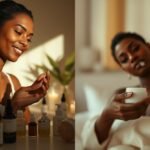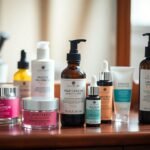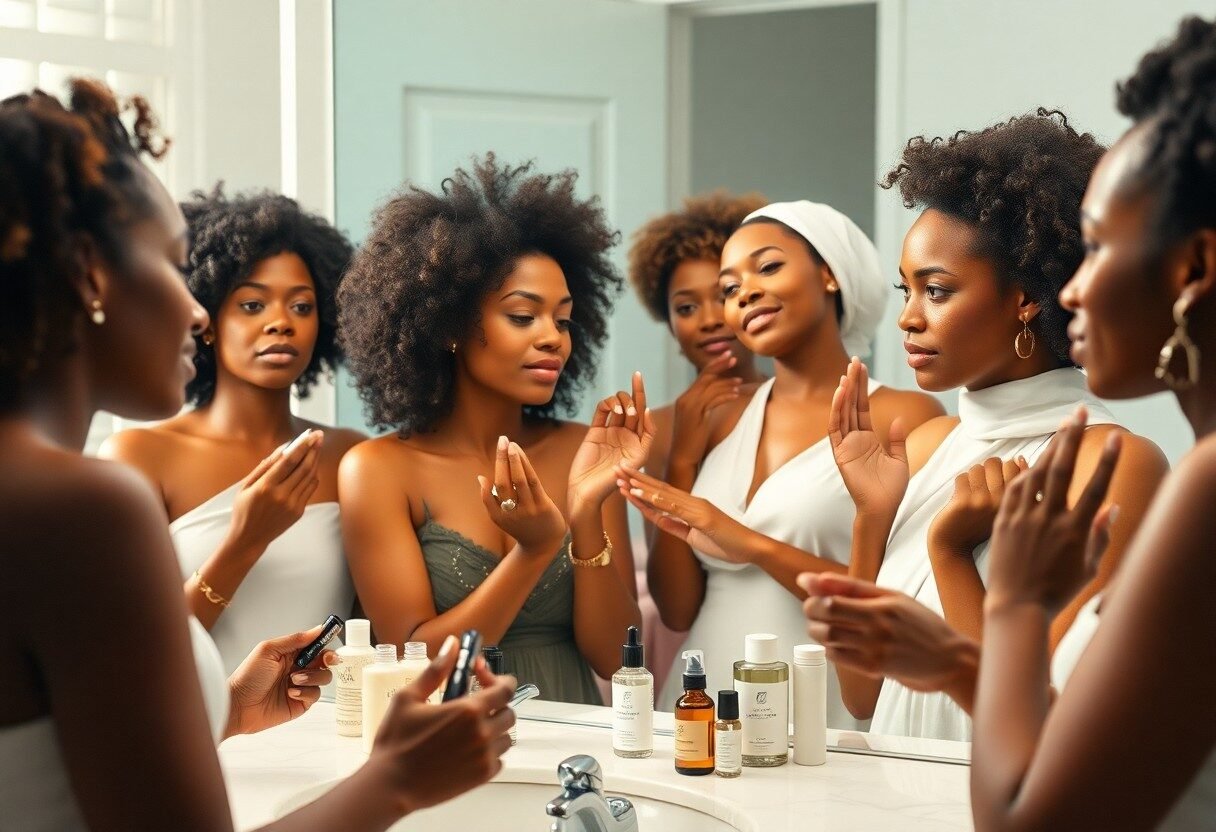
Skincare is an vital part of maintaining healthy, radiant skin, especially for African American women who face unique challenges. In this post, I will guide you through an effective routine tailored to highlight your natural beauty while addressing common concerns like hyperpigmentation and dryness. You’ll discover key products that cater to your skin type and tips to protect against environmental stressors. By following this guide, you’ll empower yourself to achieve a glowing complexion and boost your confidence from within.
Key Takeaways:
- Prioritize hydration by using a lightweight, oil-free moisturizer to maintain skin balance.
- Incorporate a gentle exfoliating product at least once a week to remove dead skin cells and promote cell turnover.
- Choose a broad-spectrum sunscreen with at least SPF 30, as it’s imperative for protecting darker skin tones from UV damage.
- Opt for hydrating ingredients like glycerin and hyaluronic acid to help retain moisture in the skin.
- Include serums with vitamin C to brighten the complexion and tackle hyperpigmentation common in African American skin.
- Be mindful of product ingredients, avoiding those with alcohol or harsh chemicals that can lead to dryness and irritation.
- Establish a consistent nighttime routine that includes cleansing, moisturizing, and treatment serums for optimal skin repair.
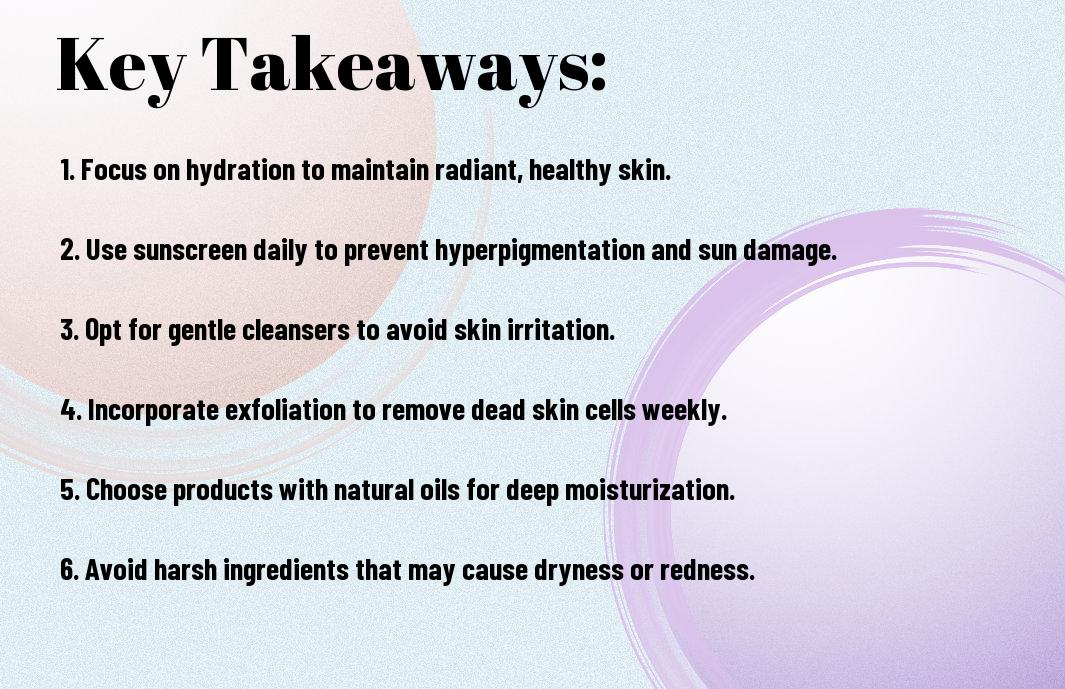
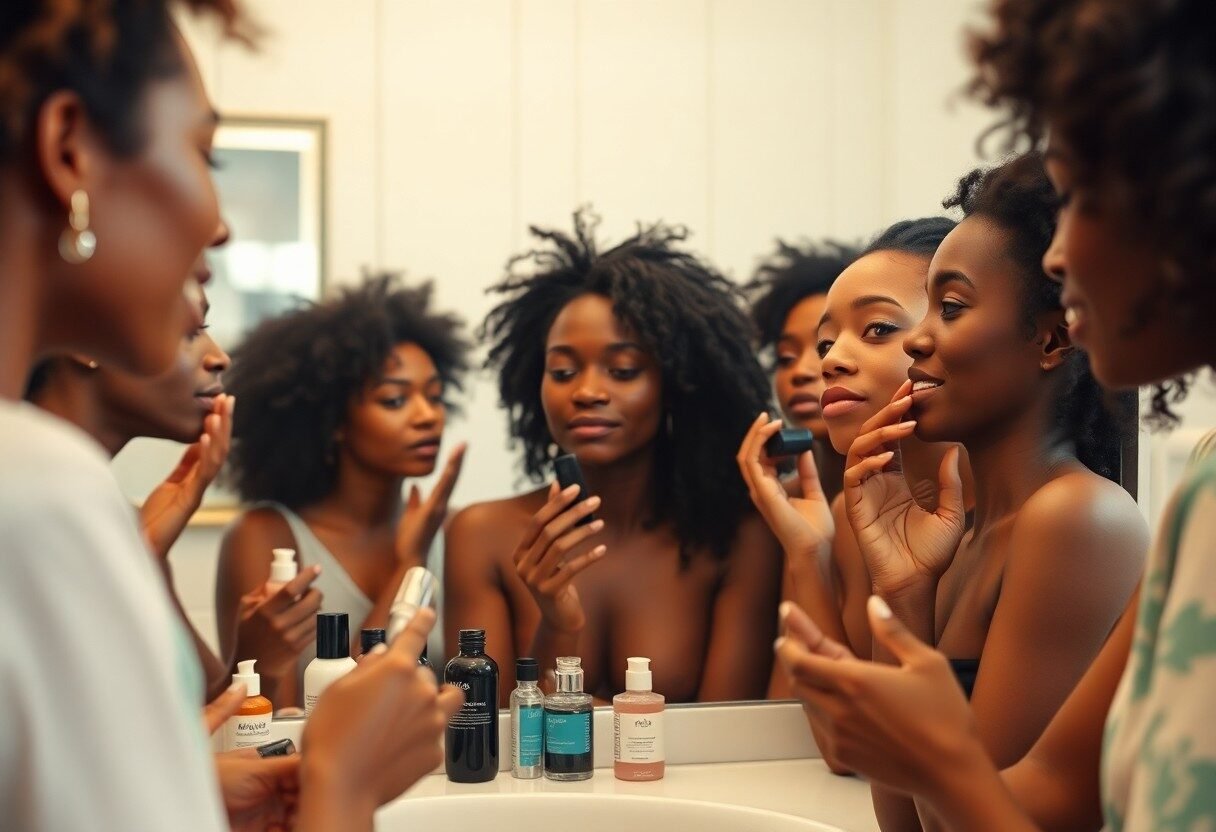
The Unique Landscape of African American Skin
Melanin and Its Role in Skin Tone and Care
Melanin, the pigment responsible for skin color, plays a significant role in the uniqueness of African American skin. Higher levels of melanin offer some natural protection against UV rays and contribute to a rich, radiant complexion. However, this resilience does not negate the need for proper skincare. Tailoring your routine to address your specific needs, such as hydration and product compatibility, ensures that your skin maintains its health and vibrancy.
Common Skin Conditions in African American Women
Skin conditions such as hyperpigmentation, keloids, and acne are often more prevalent among African American women. Due to the distinct structure and sensitivity of this skin type, understanding these conditions can lead to better management and care strategies.
Hyperpigmentation, characterized by dark patches on the skin, occurs when melanin production is triggered by factors like sun exposure or inflammation. African American women might also experience keloids—raised scars that form at the site of skin injury—more frequently than other ethnic groups. Acne can also present differently in women with darker skin tones, often leading to post-inflammatory hyperpigmentation that can linger long after the acne fades. Tailoring your skincare routine to combat these issues effectively can lead to a healthier, more even skin tone.
The Core Elements of an Effective Skincare Regimen
Cleansing: Choosing the Right Cleanser
Finding the right cleanser is necessary for maintaining your skin’s health. For African American women, I recommend focusing on creamy, hydrating cleansers that are free from harsh sulfates, as these can strip your skin of its natural oils. Look for ingredients like glycerin and coconut oil, which clean while providing moisture. A gentle, sulfate-free formula will effectively remove dirt and makeup without leaving your skin feeling tight or dry.
Exfoliation: Chemical vs. Physical Methods
Exfoliation is vital in preventing clogged pores and promoting a brighter complexion. There are two primary methods: physical and chemical exfoliation. Physical exfoliants use granules to manually slough off dead skin, whereas chemical exfoliants dissolve dead skin cells using acids or enzymes. For those with African American skin, I typically favor chemical exfoliants like glycolic or lactic acid, as they provide a more even tone and minimize the risk of irritation or micro-tears.
When choosing between physical and chemical exfoliation, consider your skin’s specific needs and sensitivities. Chemical exfoliants can be gentler and more effective, especially for achieving the coveted glow without the harshness of scrubbing motions. Depending on your skin type, you may opt for weekly treatments with low concentrations of alpha hydroxy acids (AHAs) or beta hydroxy acids (BHAs) to maintain smooth texture and clear pores without the risk of over-exfoliation.
Toning: Why It Matters for Balanced Skin
Toning is an often-overlooked step that plays a vital role in achieving balanced skin. A good toner helps to restore your skin’s pH after cleansing, hydrates, and can provide additional benefits, like minimizing pores or preventing breakouts. Look for alcohol-free toners with ingredients such as witch hazel, rose water, or aloe vera for hydration without added dryness.
Incorporating a toner into your routine can enhance overall skincare effectiveness. For example, using a hydrating toner enriched with antioxidants can help protect your skin from environmental stressors while reducing inflammation. Regular use of toner not only helps to refresh the skin, but it can also optimize the absorption of serums and moisturizers applied afterward, leading to a more radiant and youthful appearance.
Hydration Heroes: Moisturizers and Serums that Deliver
Understanding Skin Types and Choosing Ingredients
Knowing your skin type is the first step toward selecting the right moisturizers and serums. For example, if you have oily skin, look for lightweight, gel-based products that won’t clog pores. For dry skin, richer creams infused with hydrating ingredients are vital. Combination skin typically benefits from a balance of both. Here’s a quick breakdown:
| Skin Type | Recommended Ingredients |
| Oily | Oil-free gels, salicylic acid, niacinamide |
| Dry | Rich creams, shea butter, ceramides |
| Combination | Balanced moisturizers, hyaluronic acid, jojoba oil |
| Sensitive | Fragrance-free, aloe vera, chamomile |
| Normal | Lightweight creams, glycolic acid, vitamin E |
This knowledge empowers your choices, ensuring you invest in products that truly meet your skin’s needs.
The Power of Hyaluronic Acid, Glycerin, and Oils
Hyaluronic acid, glycerin, and oils play pivotal roles in hydrating and nourishing your skin. Each ingredient brings unique benefits, working synergistically to lock in moisture and keep your complexion glowing. Hyaluronic acid can hold up to 1000 times its weight in water, making it a superstar in hydration. Glycerin serves as a humectant, drawing moisture from the environment into your skin. Oils, such as argan or marula, provide vital fatty acids, enhancing the skin barrier and preventing water loss. Together, they create a powerful trio that transforms even the driest skin.
Sun Protection: A Non-Negotiable in Skincare
The Myth of Dark Skin and Sunscreen
Many believe that dark skin doesn’t require sunscreen due to its higher melanin content, but this is a misconception. While melanin provides some natural protection against UV rays, it doesn’t shield against all their harmful effects. Studies show that skin cancer rates are increasing among African American women, indicating that we are not exempt from potential damage. Incorporating sunscreen into your daily routine is necessary for everyone, regardless of skin tone.
Best Practices for Daily Sun Protection
Achieving optimal sun protection involves using a broad-spectrum sunscreen with an SPF of at least 30, applying it generously to all exposed skin, and reapplying every two hours, especially after swimming or sweating. Integrating this into your morning routine is easy; simply apply as the last step before makeup or moisturizer. Look for products designed specifically for your skin type to ensure they feel comfortable and don’t lead to breakouts or excess oiliness.
To further enhance protection, consider wearing protective clothing, hats, and sunglasses when outdoors. Try to seek shade, particularly during peak hours between 10 AM and 4 PM, when UV rays are most intense. Don’t overlook lip balm with SPF, as lips can be easily forgotten yet are vulnerable to sun damage. Combining these practices creates a comprehensive approach, allowing you to enjoy the sunshine while diligently caring for your skin’s health.
Targeting Specific Concerns with Targeted Treatments
Dealing with Hyperpigmentation: The Best Ingredients
For hyperpigmentation, I recommend incorporating ingredients like hydroquinone, kojic acid, and vitamin C into your routine. These ingredients help to brighten dark spots and even your skin tone. Applying sunscreen daily is non-negotiable to prevent further darkening of these spots. Among natural remedies, licorice extract and niacinamide are also beneficial and can work wonders as part of your regimen.
Addressing Acne: Treatments and Techniques
To tackle acne effectively, I find that products containing salicylic acid, benzoyl peroxide, or retinol can be game-changers. These active ingredients work to unclog pores, reduce inflammation, and promote cell turnover. Additionally, you might benefit from non-comedogenic moisturizers that won’t exacerbate breakouts, ensuring your skin remains hydrated without clogging your pores.
When focusing on acne treatments, you should also explore incorporating chemical exfoliants into your routine, such as glycolic or lactic acid. These help in shedding dead skin cells, thus preventing clogged pores. Regular use of clay masks can further absorb excess oil and minimize shine, while you should consider professional treatments like chemical peels or extractions for stubborn cases. Staying consistent with your routine is vital, and don’t hesitate to consult a dermatologist for personalized advice tailored to your unique skin needs.
The Role of Diet and Lifestyle in Skin Health
Foods That Fuel Radiant Skin
A diet rich in antioxidants, healthy fats, and vitamins plays a significant role in achieving that radiant glow. Incorporating foods like berries, avocados, and leafy greens can promote skin elasticity and combat free radicals. Omega-3 fatty acids found in salmon and walnuts also support skin hydration, while vitamins C and E work together to protect against skin damage and promote healing. A well-rounded diet tailored to your skin’s needs is a game-changer.
The Impact of Hydration and Sleep on Skin Quality
Your body’s hydration level directly affects the appearance and health of your skin. Insufficient water intake leads to a dull complexion and may exacerbate dryness, while proper hydration helps maintain its elasticity and overall suppleness. Adequate sleep is equally important; during deep sleep, your body repairs and regenerates skin cells. Aim for 7-9 hours of quality sleep each night to wake up with a refreshed, luminous complexion.
Proper hydration and sleep also work hand-in-hand to combat common skin issues like puffiness and dark circles, particularly for African American women who may be prone to hyperpigmentation. Hydration boosts blood circulation, ensuring your skin receives the nutrients it needs to thrive. Studies suggest that drinking enough water can visibly improve skin texture, reducing the appearance of fine lines and giving you a youthful luminosity. On the sleep front, insufficient rest can trigger stress hormones that lead to breakouts, making sleep a vital component of your skincare strategy.
Building a Sustainable Routine: Daily vs. Weekly Care
Structuring Your Daily Routine
A successful daily skincare routine consists of few imperative steps tailored to your unique skin type. Start with a gentle cleanser to remove impurities, followed by a hydrating toner that balances your skin’s pH. I recommend using a serum packed with ingredients like hyaluronic acid or vitamin C for an extra boost. A nourishing moisturizer tailored for your skin type ensures hydration, while broad-spectrum sunscreen protects you from harmful UV rays. Consistency transforms your skin, so try to stick to this routine morning and night.
Incorporating Weekly Treatments
Weekly treatments elevate your regimen by addressing specific skin concerns more deeply than daily products can. Exfoliation, for example, helps remove dead skin cells, revealing a brighter layer underneath. You can also use clay masks to draw out impurities or hydrating masks packed with nourishing elements like honey and aloe. Additionally, consider incorporating a weekly oil treatment if dryness is an issue, as it can restore your skin’s natural moisture barrier.
Varying your weekly treatments adds resilience to your skin. For instance, using chemical exfoliants containing AHAs or BHAs once or twice a week helps maintain smoothness and prevent clogged pores. On alternate days, a nourishing mask with hydrating ingredients, like shea butter or avocado oil, combats dryness. Adjusting the frequency and type of treatments as the seasons change allows your skin to respond better and stay vibrant throughout the year. Finding a balance that works for your skin will make your routine sustainable and effective over time.
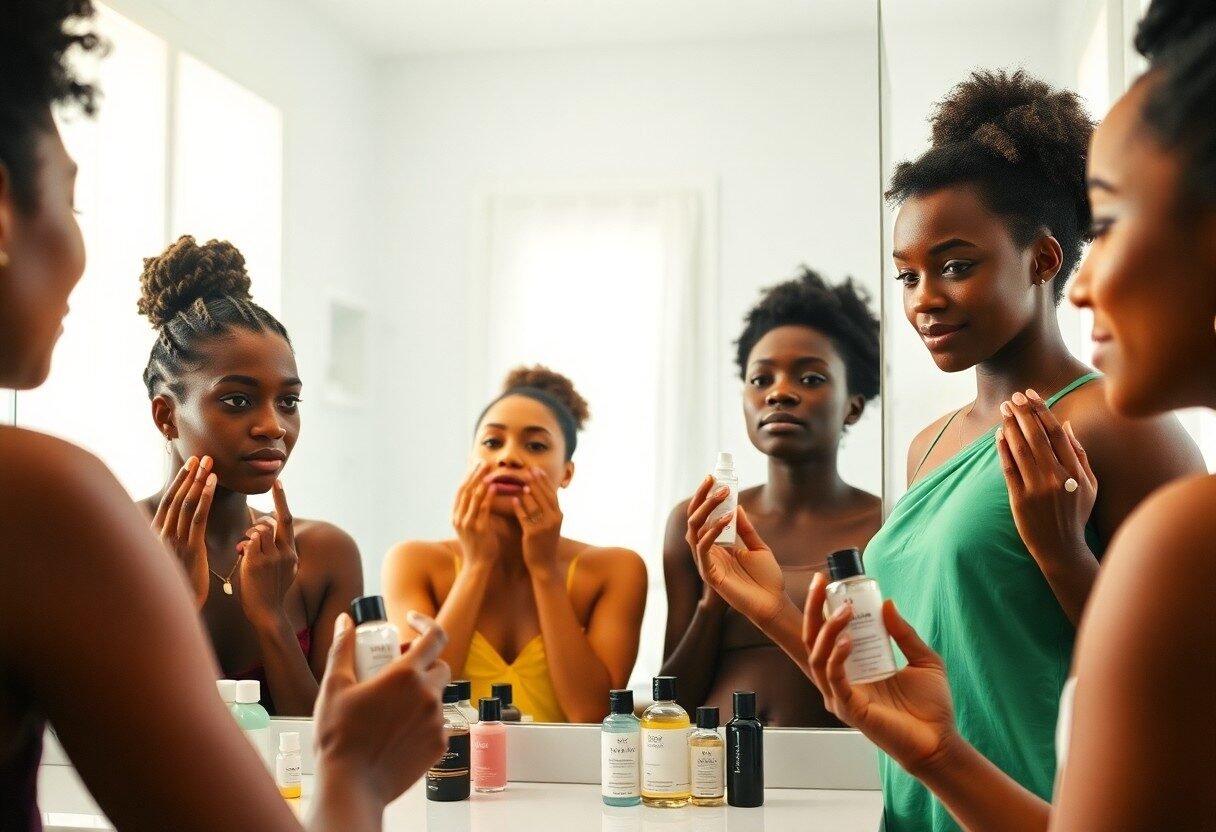
Understanding Product Labels: Decoding Ingredients
What to Look For on a Skincare Label
As you navigate through skincare products, focus on key ingredients that offer real benefits. Look for terms like “non-comedogenic” for formulations that won’t clog pores, “hypoallergenic” which reduces allergic reactions, and “fragrance-free” to avoid irritation. Ingredients such as shea butter, hyaluronic acid, and vitamin E are great for moisturizing and nourishing healthy skin. The presence of natural oils, like jojoba or argan oil, suggests additional hydration and may enhance your skincare routine.
Common Skincare Myths Debunked
Misconceptions can lead to misguided choices. One prevalent myth is that darker skin doesn’t need sunscreen. In reality, all skin tones are susceptible to UV damage, so broad-spectrum sunscreen is imperative to prevent hyperpigmentation and skin cancer. Another common belief is that oily skin doesn’t need moisturizer. In truth, even oily skin should be moisturized; a lightweight, oil-free option works best to prevent dryness without increasing shine.
Debunking skincare myths is vital for achieving your healthiest skin. A common misbelief is that using a lot of products ensures better results. Overloading your skin can lead to irritation, especially when introducing new ingredients too rapidly. Similarly, the truth is that exfoliation benefits all skin types; the key lies in choosing the right method and frequency. Understanding accurate information empowers you to make educated decisions, leading to improved skin health and confidence.
Final Words
To wrap up, establishing the ultimate skincare routine for African American women is all about understanding your unique skin needs and embracing products that enhance your natural beauty. I encourage you to prioritize hydration, sun protection, and gentle exfoliation to achieve a radiant complexion. By investing time in your skincare and tailoring it to your specific concerns, you can achieve healthy, glowing skin that reflects your unique identity. Your skin deserves the best, and with the right approach, you can enhance its natural beauty effortlessly.
FAQ
Q: What should be the first step in an effective skincare routine for African American women?
A: The first step is cleansing your face. Use a gentle, sulfate-free cleanser that effectively removes makeup, dirt, and excess oil without stripping the skin of its natural moisture. Look for cleansers that include natural ingredients, such as aloe vera or chamomile, which can soothe and hydrate your skin.
Q: How often should I exfoliate my skin?
A: It is generally recommended to exfoliate two to three times a week, depending on your skin type. Choose chemical exfoliants with AHAs or BHAs for a more even and gentle approach, particularly for African American skin, which can be prone to hyperpigmentation. Be cautious with physical scrubs, as they can irritate rather than help your skin.
Q: What are the best moisturizers for African American skin?
A: Look for moisturizers that contain ingredients such as shea butter, glycerin, jojoba oil, or hyaluronic acid. These ingredients help retain moisture and add hydration without feeling greasy. For oily skin types, lightweight gel moisturizers can be effective, while drier skin may benefit from creamier formulations.
Q: How important is sun protection in my skincare routine?
A: Sun protection is imperative regardless of skin tone; UV rays can still damage deeper layers of skin and aggravate hyperpigmentation. Choose a broad-spectrum sunscreen with at least SPF 30 and apply it daily, even on cloudy days and when indoors, as UV rays can penetrate windows.
Q: Should I use different products for day and night?
A: Yes, using different products for day and night can enhance your skincare routine. During the day, focus on lightweight, non-comedogenic products that protect and hydrate your skin. For nighttime, opt for richer creams and serums that contain reparative ingredients like retinol or peptide complexes to help skin regenerate.
Q: What are some common skincare concerns for African American women?
A: Common concerns include hyperpigmentation, dry skin, and conditions like eczema or psoriasis. Tailor your skincare products to address these issues, often with vitamin C serums for brightening dark spots and nourishing oils or creams for hydration. It’s beneficial to consult a dermatologist for personalized treatment options.
Q: How can I effectively treat hyperpigmentation?
A: To treat hyperpigmentation, incorporate products containing vitamin C, niacinamide, or hydroquinone into your routine. Exfoliation and sun protection are key components of the treatment process. Regularly applying sunscreen and using protective clothing will prevent further darkening of existing spots while new ones are being targeted.
